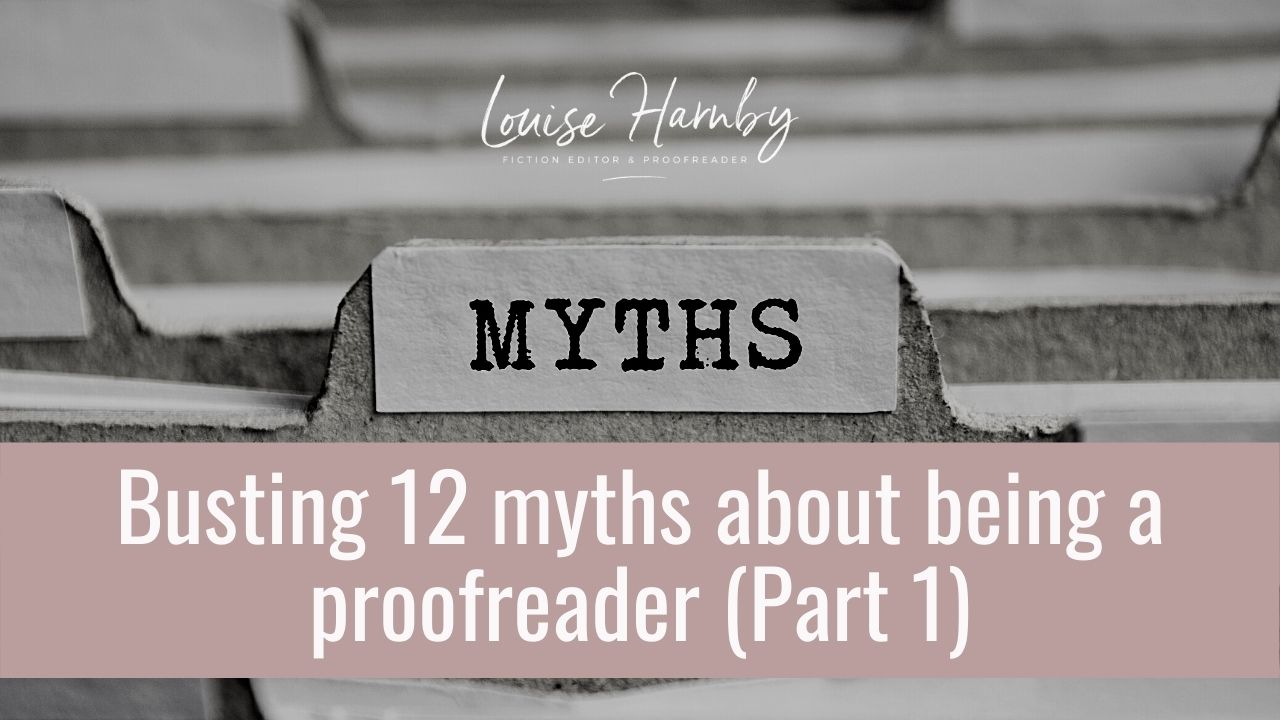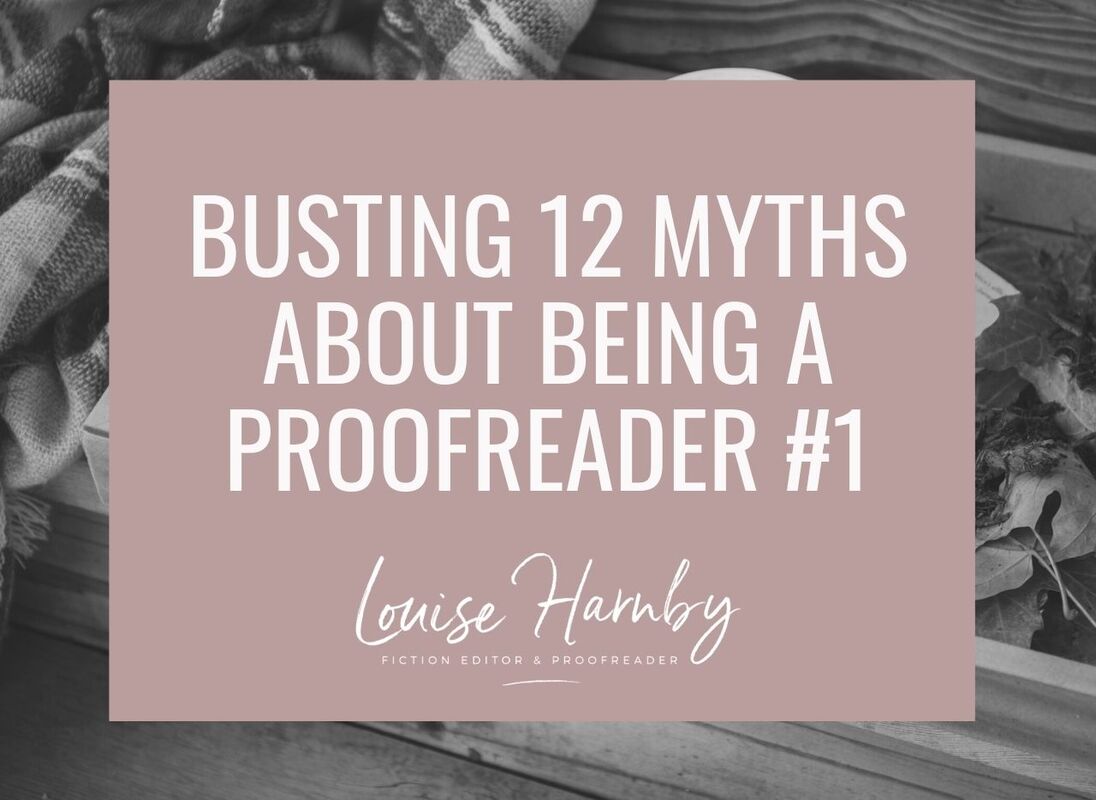|
Thinking about becoming a proofreader? Here are 12 myths you should be aware of.
None of the following statements is an absolute truth.
In this article, I look at Myths 1–6; in Part 2, I’ll cover Myths 7–12. Myth 1: You can't get work unless you have contacts in the publishing industry If you want to proofread for the publishing-industry, it can help if you have a contact. A contact will give you a foot in the door. That’s all it will do, though. Publishers won’t just hand you a book; you’ll most likely have to do a test to prove your competence. Of course, if you don’t have a contact, you’ll have to make one – you can pick up the phone, write a letter and enclose a CV, or send an email. If you have the skills that publishers are looking for, and you contact them and tell them this, there’s no reason why you can’t acquire work from this sector even if you have no existing in-house friends or colleagues. Ten years ago, I had one contact in the publishing industry. The rest I acquired through targeted direct marketing – letters, emails and phone calls. A more significant problem with this myth is its presumption that all self-employed business proofreaders and editors work for publishers, and only for publishers. Publishers are only one type of client. Ten years ago, 90% of my clients were publishers; these days, 90% of my clients aren’t publishers. Myth 2: The market is shrinking The market is not shrinking; it’s changing. It's even expanding in some sectors. Increasing numbers of people are recognizing the benefits of ensuring that their text is professionally presented. Our world is more public than ever. Anyone with an online presence (e.g. a website, a blog, an online report, an ebook) has a public presence. And if that public presence is represented by words, those words need to be polished. That’s where the editorial professional comes in. The independent-publishing market is booming, with self-publishers uploading fiction and commercial non-fiction to public spaces on a daily basis. Many of those writers are commissioning proofreaders. So are NGOs, businesses, marketing and communications agencies, packagers, schools, public-sector organizations, students, charities, poets, musicians and traditional publishers. The challenge lies not in the myth that the market is shrinking, but in the myth that it's easy to be visible in that market. Myth 3: Training courses are a waste of time and money This myth argues that editorial training isn’t worth investing in because the work isn't well paid enough to give you a return on that investment. Some proponents of this myth also state that no one pays attention to editorial qualifications.
Myth 4: Training, by itself, is enough to get you work Having espoused the benefits of training, it’s equally important to debunk the myth that training alone will get you work. It doesn’t matter whether you have distinctions and accreditations coming out of your ears, and lots of real-world experience – if no one knows you exist, they won't be able to be impressed by all your training! To get work, you must put yourself in front of your clients – that means being visible, which means marketing. Myth 5: All publisher-based proofreading work goes to former editors and former workmates of publishers This myth is similar to (1). Yes, it can be an advantage initially, but plenty of people without a publishing background who’ve made the effort to market themselves using a chunky box of promotion tools have been able to secure work. The governor of the Bank of England knows that you need more than one instrument to stabilize an economy; the business of proofreading is not so different. Proofreaders, too, need more than one instrument to generate a stable client base and income stream.
Myth 6: All proofreading work is poorly paid This myth has several problems:
Don't get me wrong – success won't happen overnight. As is the case for any new business owner, it will take time and hard work to build a decent income stream and client base. Work won't just fall into your lap. But if you behave like a professional business owner in terms of quality and visibility, the concept of low pay (however you’re defining it) doesn’t have to define your editorial business. In Part 2, I’ll bust Myths 7–12.
Louise Harnby is a line editor, copyeditor and proofreader who specializes in working with crime, mystery, suspense and thriller writers.
She is an Advanced Professional Member of the Chartered Institute of Editing and Proofreading (CIEP), a member of ACES, a Partner Member of The Alliance of Independent Authors (ALLi), and co-hosts The Editing Podcast. Visit her business website at Louise Harnby | Fiction Editor & Proofreader, say hello on Twitter at @LouiseHarnby, connect via Facebook and LinkedIn, and check out her books and courses.
4 Comments
Clive Hislop
10/3/2017 10:17:05 am
In 'Myth 4', did you intend to write 'and lots or real-world experience', or should it be 'and lots of real-world experience'?
Reply
10/3/2017 10:30:53 am
No, Clive, not deliberate! I just introduced an error when I uploaded the article to Weebly and started tinkering with the text (never a good idea) and easily done at 1 a.m.!
Reply
1/10/2019 02:13:14 pm
Thanks again, Louise, for your words of wisdom and encouragement. You do a great job of showing people what proofreading is really like.
Reply
Louise Harnby
1/10/2019 02:19:03 pm
Thank you, Helen! I really appreciate that!
Reply
Leave a Reply. |
BLOG ALERTSIf you'd like me to email you when a new blog post is available, sign up for blog alerts!
TESTIMONIALSDare Rogers'Louise uses her expertise to hone a story until it's razor sharp, while still allowing the author’s voice to remain dominant.'Jeff Carson'I wholeheartedly recommend her services ... Just don’t hire her when I need her.'J B Turner'Sincere thanks for a beautiful and elegant piece of work. First class.'Ayshe Gemedzhy'What makes her stand out and shine is her ability to immerse herself in your story.'Salt Publishing'A million thanks – your mark-up is perfect, as always.'CATEGORIES
All
ARCHIVES
July 2024
|
|
|
|

















 RSS Feed
RSS Feed





